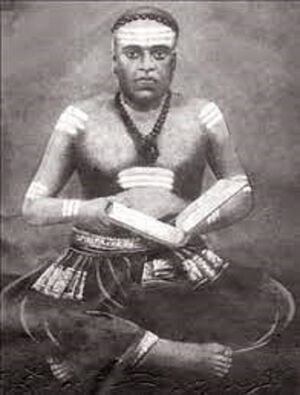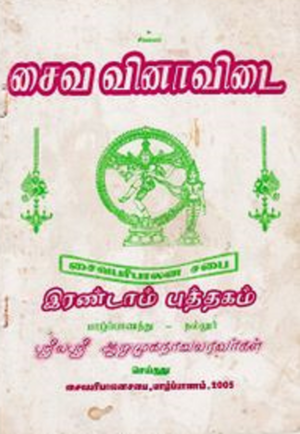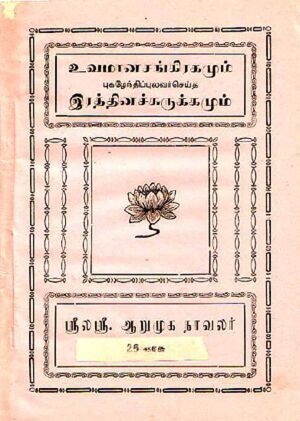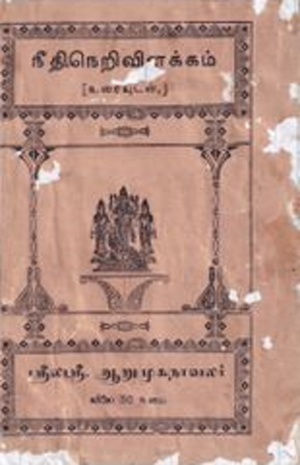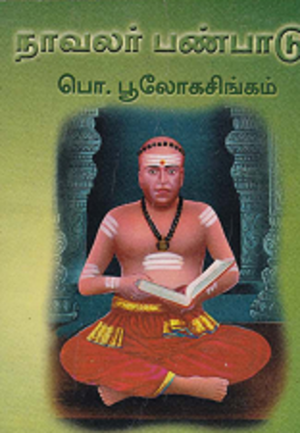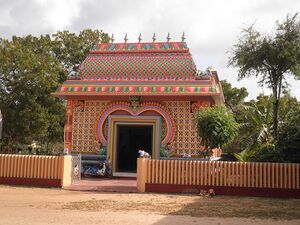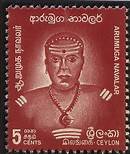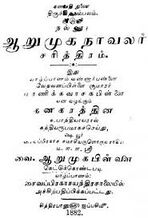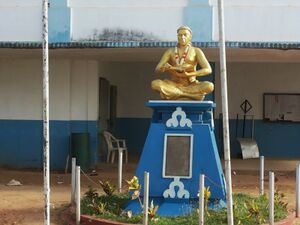Arumuka Navalar
இந்தப் பக்கத்தை தமிழில் வாசிக்க: ஆறுமுக நாவலர்
Arumuka Navalar (December 18, 1822 - December 5, 1879) was a Tamil scholar, Saivam scholar, teacher in Tamil and English, Translator, Publisher, Commentator and Orator. He published many ancient Tamil texts including Thirukkural Parimelazhagar Urai[1] and Nannool Kandigai. Arumuka Navalar is remembered for his discourses on Saivam religion and publishing work . He is one of the primary figures in the nineteenth-century Saivam Revival Movement.
Birth and Education
Arumuka Navalar was born as the last son to Kandapillai and Sivagami on December 18, 1822, in Nallur, Jaffna Srilanka. Navalar's birth name was Arumugampillai. He started learning from the age of five. Arumuka Navalar learned Moothurai[2] and similar books on ethics also linguistic books such as Nigandu from Subramaniya Upadhiyayar at Thinnai (porch) school. He completed higher education from Saravanamuthu Pulavar and Senathirasa Mudaliyar. Arumuka Navalar showed erudition in Tamil and Sanskrit. He studied English at Wesleyan Methodist Central College, Jaffna.
Work as a Teacher
Arumuka Navalar worked as a teacher for some time at Wesleyan Methodist Central College, where he studied. He taught many students on his porch. Arumuga Thambiran was his student.
Bible Translation
Arumuka Navalar was close to pastor Peter Percival and worked as an editor on the team that translated the Bible into Tamil. Arumuka Navalar worked along with Vaddukoddai Gurumadam. When the Bible translation work was going on in Jaffna, Arumuka Navalar and Peter Percival went to Chennai, to establish which translation was the best, after hearing that the Christian church in Chennai was doing the same. Mazhavai Vidwan Mahalinga Iyer acted as arbitrator and ruled that the translation of the Arumuka Navalar was the best. It is said that it was accepted as the final version.
Work on Saivam
In Sri Lanka, the American Mission established the Vaddukoddai Gurumadam and Tellippalai College and actively propagated Christianity. The elites of Jaffna were converting to Christianity for the sake of English education. Arumuka Navalar thought it would destroy Saivam and became a propagator of Saivism. He began his work on Saivam by publishing rebuttal of pamphlets from Christians denouncing Saivam. He published booklets and pamphlets. He wrote a commentary on Saivam psalms.
Arumuka Navalar wrote small books. He continued to work to restore antiquity and tradition. Arumuka Navalar started a Saivit school called Saiva Prakasa Vidyasalai' on November 11, 1864, in Chidambaram. Arumuka Navalar attempted to rebuild the ancient Siva temple of Naguleswaram in Jaffna, which was destroyed by the Portuguese. He performed sermons on Shaivism.
Arumuka Navalar went to Chennai along with Nallur Sadasivam Pillai in Tamil month Aadi 1849 to buy a printer to print textbooks on Saivam. There he gave a lecture on Saivam at Thiruvaduthurai Adheenam and received the title 'Navalar' for his erudition, from Thiruvaduthurai Adheenam. He stayed in Chennai for a while, published Soodamani Nigandu and Saundarya Lahari and returned to Jaffna with a printing machine.
Arumuka Navalar established a printing house Vidhyanubalana Atchiyantharasalai' at his residence and published books like Baalapadam, Aathichoodi, commentary on Kondraivendhan, Sivalayatharisanavidhi, Saivasamayasaaram, Kolaimaruthal, Nanool Viruthiyurai, Thirichendinirottaka Yamagavanthathiyurai and commentary on Tirumurukatruppadai. He wrote Thiruthondar Periya Puranam in a dialogue form. Also, he published texts like Gyanakummi, Yesumathaparigaram and Vachirathandam.
Arumuka Navalar returned to Chennai and published Thiruvasagam and Thirukkovaiyar in the Tamil month Vaikasi, 1859. He established Vidhyanubalana Atchiyantharasalai' in Thangasalai, Chennai and published various Saivam texts. After staying in Chennai, Thiruvaduthurai and Thirunagaikoranam and giving sermons on Saivism, he returned to Jaffna in the Tamil month Panguni, 1862.
On the Tamil month Margazhi, 18963 Arumuka Navalar came to Tamil Nadu again. He addressed in Ramanathapuram. From there, he went to Madurai and spoke at Meenakshi Amman Sannidhanam. He addressed in Kundrakudi Adheenam, Tirupperunturai, Thirupullirukkuvelur and Sirkali. Arumuka Navalar went to Chidambaram and established Chidambaram Saivaprakasa Vidhyasalai in the Tamil month of Aippasi, 1864. Returning to Chennai in the Tamil month Margazhi 1866, Arumuka Navalar became involved in preaching Shaivam and printing and publishing books.
Arumuka Navalar started a Shaivam school at Copay in 1870 and ran it at his own expense. In 1871, Shaivam students were expelled by John Kilner for wearing holy ash at the Wesleyan English School, Vannarpannai. For the benefit of the children, Arumuka Navalar established and ran a Saivam school at Vannarpannai in 1872. This school ran only for four years owing to a lack of funds.
In the Tamil month of Aippasi in 1872, Arumuka Navalar compiled the facts he had learned from his experience up to that time and named it the Yazhpana Samaya Nilai. Between 1875 and 1878, Arumuka Navalar involved in writing books such as Nanool Viruthiyurai, Naidathavurai, Thiruvilaiyadal Puranam, Nanoor Kaandigaivurai, Sivapoosa Vidhi, Moondram Anutaana Vidhi, Guru Sishya Kiramam, Poosaikku Idampannum Vidhi, Siraatha Vidhi, Tharupana Vidhi, Bosana Vidhi, Tamil Agarathi, Tamil-Samaskrutha Agarathi, Tamil-Aangila Agarathi and involved in sermons on Saivam.
Arumuka Navalar had a strongly traditional view related to Saivam. Arumuka Navalar argued that Saiva Agamas[3] should be practiced in all temples without exceptions. Arumuka Navalar was not at all receptive to individualist trends within Saivism in Chidambaram Temple or new trends such as Ramalinga Vallalar's movement branching out into Saivism. He was in close contact with Shaiva monasteries (mutts or madams) . He thought that the monasteries should take the lead in establishing the tradition.
Arumuka Navalar believed that Saivam was southbound. So he presented the Saiva Thirumuraigal as the Saivite texts next to the Agamas[3]. He tried to practice Tevaram Parayanam [4]in temples.
Arumuka Navalar emphasized traditional Saiva ethics. He insisted that the Saivas should observe all the rituals of life, including taking Siva Deekshai[5]. He asked Siavites to abstain from eating with the lower castes and from touching the lower caste people.
Basically, Arumuka Navalar can be defined as a traditionalist and conservative.
Literary Works
Orator
Arumuka Navalar's primary medium was the oration. He started delivering his sermon on December 31, 1847, at Vaitheeswaran temple in Vannarpannai. That is what made him a Saiva scholar. A life-long orator, his last sermon was delivered in 1879 at Sundaramoorthy Swami's Gurupoosai day, Adichuvadi, at Vannarpannai Saivaprakasa Vidhyasalai.
Commentator
Arumuka Navalar has written books on two platforms. His books were based on Tamil grammar and Saiva norms. Arumuka Navalar has written 24 books. He has written commentary for 16 books. Some of the books he wrote include children's literature such as Aathichoodi, Kondraivendhan and Nalvazhi. Arumuka Navalar is known as 'Father of Tamil prose writing' and 'Father of Tamil dialogue writing'. Arumuka Navalar introduced full stop, semi-colon, question marks and exclamation marks used by westerners to Tamil.
Publisher
Arumuka Navalar was engaged in the work of finding palm leaf manuscripts and publishing the ancient texts. He published books such as Baalapadam, Aathichoodi, commentary on Kondraivendhan, Sivalayatharisanavidhi, Saivasamayasaaram, Kolaimaruthal, Nanool Viruthiyurai. He published 44 books in various genres like grammar, religious texts and epics.
'Arutpa Marutpa' debate
The songs written by Vadalur Ramalinga Vallalar were published under the name Arutpa. Arumuka Navalar argued that the word Arutpa[6] applies only to Saiva Thirumurai and Ramalinga Vallalar's hymns should not be called that. Many people on both the sides wrote rebuttals. Arumuka Navalar filed a court case that Ramalinga Vallalar had insulted him. Ramalinga Vallalar denied that he did not say so and that alone was enough to withdraw the case. (Refer Arutpa Marutpa Debate)
Awards
- Thiruvaduthurai Adheenam conferred the title Navalar
Death
Arumuka Navalar died on December 5, 1879 (Tamil month Karthikai 21) at his home in Vannarpannai.
Memorials and Biographies
- The Government of Sri Lanka issued a commemorative postage stamp on October 29, 1971 in honor of Arumuka Navalar
- A Navalar Mani Mandapam has been erected near the Nallur Kandaswamy temple.
- Nallur Arumuka Navalar History - V. Kanagaratna Upathiyar
- Arumuka Navalar history, T.Kailasapillai
- Yazhpanam Nallur Arumuka Navalar a Short History - C. Chelliah Pillai
Criticisms
Arumuka Navalar is criticized for his hard stance on Saivam. He advocated Saiva Agama based worship and strongly opposed all other forms of worship. This was also criticized.
Nallur Arumuka Navalar emphasized Saiva ethics. He introduced old customs including untouchability. He is condemned for this too.
Books
Books published by Arumuka Navalar are available in Noolagam - Internet library
Written and Published Shaiva Religious texts
- Shaiva Samaya Saaram
- Sivalaya Tharisana Vidhi
- Nithya Karuma Vidhi
- Siraartha Vidhi
- Tharpana Vidhi
- Gurushishyakiramam
- Marutpa (Poliarutpa Maruppu)
Written and Published criticisms on Christianity
- Shivathoodana Parigaram
- Mathiyavatha Nirasanam
- Supira Botham
- Vachirathandam
Refer Condemnation issues
Written and Published Prose Texts
- Periyapurana Vasanam
- Thiruvilaiyadalpurana Vasanam
- Kandapurana Vasanam
- Periyapurana Soosanam
- Yazhpana Samayanilai
Written and Published Textbooks
- Baalapadam 1
- Baalapadam 2
- Baalapadam 3
- Baalapadam 4
- Ilakana Vina Vidai
- Shaiva Vina Vidai
Published Books
Original Editions
- Villiputhoorar Bharatham
- Sethu Puranam
- Kanda Puranam
- Periya Puranam
- Thiruvasagam
- Thirukkovaiyar
- Thiruchendhuragaval
- Naalvar Naanmanimalai
- Maraisayanthaathi
- Chidambara Mummanikovai
- Kulathoor Amuthaambigai Pillaithamil
- Vuvamana Sangiragam
- Rathina Surukkam
Editions with Source and Commentary
- Nannool Viruthivurai
- Nannool Kaandigaiurai
- Tolkappiya Soothiraviruthi
- Chidambaramanmiyam
- Sivagyanabothamum Vaarthigamennum Pozhipuraiyum
- Ilakana Koththurai
- Tolkappiyam Sollathigaram
- Senavaraiyam
- Sivagyanabotha Sitrurai
- Sivaratri Puranam
- Sivasestralaya Mahatvasa Unmaivilakkam
- Sivalaya Tharisanavidhi
- Subramaniya Bothagam
- Ilakana Vilaka Sooravali
- Thirukkural Parimelazhagarurai
- Kolai Maruthal
- Tharukka Sangaravurai
- Annapatteeyam
- Prayoga VivegamThiruchitrambala Kovaiurai
- Thirukkovaiyar Nachinarkiniyar Urai
- Soodamani Nigandurai
புத்துரைப் Editions
- Aathichoodi
- Kondraivendhan
- Nanneri
- Nalvazhi
- Vaakundaam
- Koyirpuranam
- Tirumurukātṟuppadai
- Shaiva Samaya Neri
- Sivatharumotharam
- Thiruchenthineerotaga yamagavanthaathi
- Mathooranthathi
- Saundarya Lahari
References
- Arumuka Navalar books - Internet Library
- Arumuka Navalar history Boologa Singam, Internet Library
- Dictionary of biography of the Tamils of Ceylon, 1997 (compiled by S. Arumugam)
- Eela Naatin Tamil Sudar Manigal - Thenpuloliyur Mu. Ganapathypillai
- Sittrilakiya Poet Dictionary: N.V. Jeyaraman
- A collection of sittrilakiya Poets of Eelam who lived between 17th and 20th century: Kanaga Sreedharan Australia|Yazhpanam history - Navalar Kottam A.Muthuthambipillai(1912) | Sittrilakiya Poet Dictionary: N.V. Jeyaraman | Hindu encyclopedia - Kalakeerthi P.Boologasingam(1990)
- Arumuka Navalar
- Tamilmanuscriptology: Yazhpanam, Nallur Arumuka Navalar
- Nallur Arumuka Navalar History Internet Library
- Essays on Nallur Arumuka Navalar Internet Library
- Arumuka Navalar History: T. Kailasapillai Internet Library
Footnotes
✅Finalised Page
First published on:
20-Oct-2022, 22:10:24 IST
